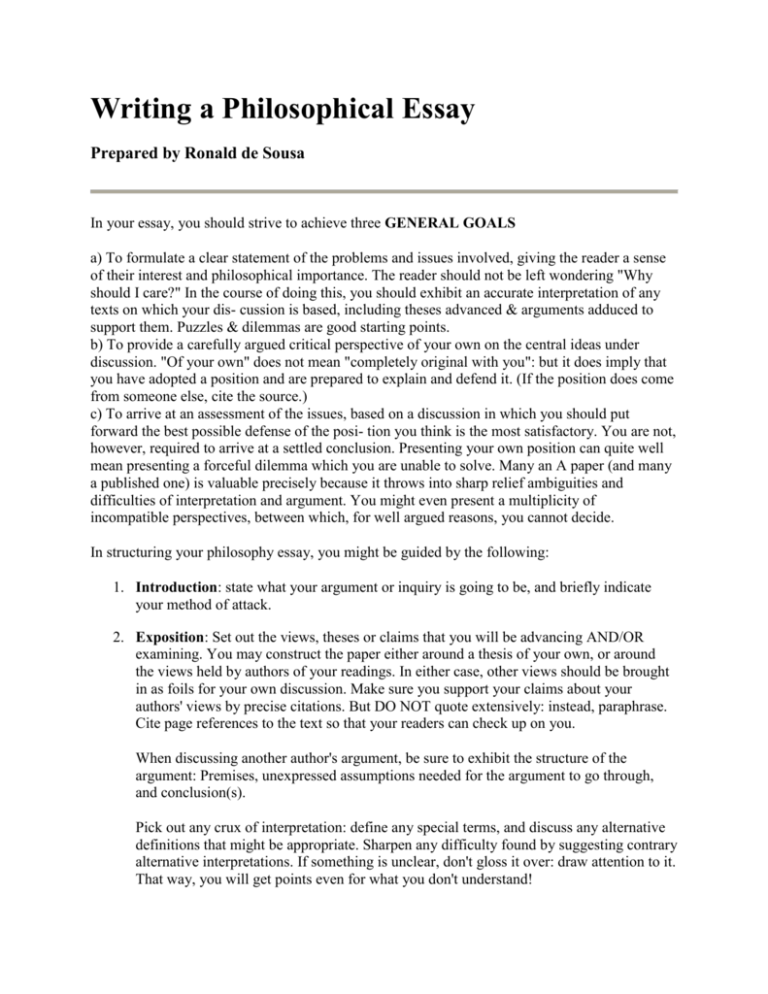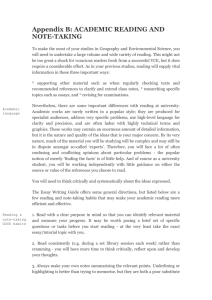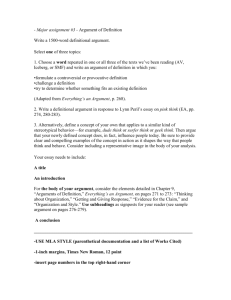Guide to Writing Philosophy Essays
advertisement

Writing a Philosophical Essay Prepared by Ronald de Sousa In your essay, you should strive to achieve three GENERAL GOALS a) To formulate a clear statement of the problems and issues involved, giving the reader a sense of their interest and philosophical importance. The reader should not be left wondering "Why should I care?" In the course of doing this, you should exhibit an accurate interpretation of any texts on which your dis- cussion is based, including theses advanced & arguments adduced to support them. Puzzles & dilemmas are good starting points. b) To provide a carefully argued critical perspective of your own on the central ideas under discussion. "Of your own" does not mean "completely original with you": but it does imply that you have adopted a position and are prepared to explain and defend it. (If the position does come from someone else, cite the source.) c) To arrive at an assessment of the issues, based on a discussion in which you should put forward the best possible defense of the posi- tion you think is the most satisfactory. You are not, however, required to arrive at a settled conclusion. Presenting your own position can quite well mean presenting a forceful dilemma which you are unable to solve. Many an A paper (and many a published one) is valuable precisely because it throws into sharp relief ambiguities and difficulties of interpretation and argument. You might even present a multiplicity of incompatible perspectives, between which, for well argued reasons, you cannot decide. In structuring your philosophy essay, you might be guided by the following: 1. Introduction: state what your argument or inquiry is going to be, and briefly indicate your method of attack. 2. Exposition: Set out the views, theses or claims that you will be advancing AND/OR examining. You may construct the paper either around a thesis of your own, or around the views held by authors of your readings. In either case, other views should be brought in as foils for your own discussion. Make sure you support your claims about your authors' views by precise citations. But DO NOT quote extensively: instead, paraphrase. Cite page references to the text so that your readers can check up on you. When discussing another author's argument, be sure to exhibit the structure of the argument: Premises, unexpressed assumptions needed for the argument to go through, and conclusion(s). Pick out any crux of interpretation: define any special terms, and discuss any alternative definitions that might be appropriate. Sharpen any difficulty found by suggesting contrary alternative interpretations. If something is unclear, don't gloss it over: draw attention to it. That way, you will get points even for what you don't understand! 3. Discussion: Criticism of the views expounded in part 2. Consider possible objections (perhaps taken from our authors, if you are highlighting a thesis of your own), and do your best to defend yourself or your author(s) against them. If an author(s)' argument is bad, explain why: Is one or more of the premises false? (This makes the argument unsound.) Does the conclusion not follow? (This is what it means to say the argument is invalid, if it is intended to be deductive. If not, the premises may just be poor reasons for the conclusion). Sometimes the best you can do might be to point out that the view you are criticizing has highly implausible consequences. Does the argument rely on assumptions that are unacceptable, or arbitrary, or debatable? Does the argument contain crucial ambiguities? Is rhetoric substituted for argument at some crucial stage? (In 2 and 3, use the methods suggested in Writing Critical Summaries) 4. [Only if you have started by considering other people's views]: Constructive Section: Here you may set out your own assessment of the issues in question, and show how it escapes the criticisms that you have leveled against the author(s) considered. You should also defend your view against any obvious objections that might be or have been leveled against it. 5. Conclusion: Here you can briefly recapitulate the gist of your argument and restate the central "message" that your paper has attempted to establish. MECHANICS: An average philosophy term essay will be about 4000-6000 WORDS (24K-36K characters; roughly 13-20 double-spaced pages). But OBSERVE WHATEVER REQUIREMENT IS GIVEN IN YOUR SPECIFIC COURSE. Don't footnote individual references: place references in the text between brackets, and append a bibliography. Material prepared by Ronald de Sousa for distribution at the University of Toronto © 1995 Ronald de Sousa







